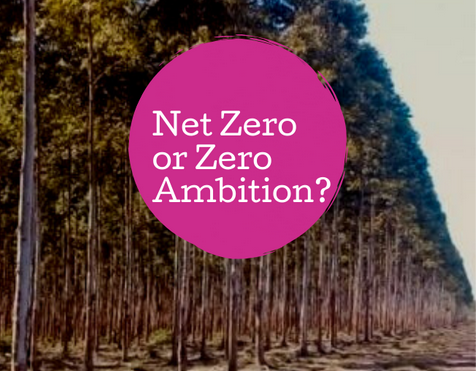by the GFC climate team
Today is the start of the three-day Net Zero Festival, an online event featuring a whole range of dirty companies such as Shell, the seventh most polluting fossil fuel company in the world, and Drax, which owns the world’s largest biomass power station and single biggest point source of carbon emissions in the UK. They will flaunt their “green” credentials, which hinge on “net zero” commitments and investments in Nature-based Solutions (NBS). With all of the illusions and trickery going on, it’s much more of a circus than a festival.
The race towards net zero emissions, which governments and corporations alike are pledging to achieve within certain timescales, is based on a flawed interpretation of the Paris Agreement which aims to “achieve a balance between anthropogenic emissions by sources and removals by sinks of greenhouse gases” in the second half of this century. Whilst this has been interpreted as a free reign to keep polluting with the vague future promise of removals through increasingly-popular NBS (predominantly forest offsets, afforestation and reforestation with tree plantations, and other false solutions), a more science-based approach detailed in the Intergovernmental Panel on Climate Change’s (IPCC) Special Report on 1.5℃ clearly associates the concept of net zero with an immediate and urgent reduction in carbon emissions towards zero first, and only considers removals as an alternative for emissions from sectors that are much harder to de-carbonise.
All of this is extremely concerning, and is an attempt to delay and shift the narrative away from the rapid and deep emissions reductions that truly ambitious climate action demands. If governments do not take the climate crisis seriously and instead keep promoting concepts such as net zero and all of the false solutions they entail, the companies whose profit margins literally depend on a worsening climate crisis (many of which feature heavily in this week’s Net Zero Circus) will simply keep operating as normal.
Shell is a good example of this. In April this year, the company released its annual briefing on responsible investment which outlined its ambition to be a net zero business by 2050. Rather than basing its climate strategy on reducing production, increasing energy efficiency and switching to truly low-carbon energy generation, it focuses on storing or offsetting emissions that it says cannot be avoided. The strategy is essentially business-as-usual with carbon capture technologies, which are techno-fixes unlikely to ever be rolled-out at scale, and with “natural solutions”, such as tree-planting, which Shell will invest $300 million in over the next three years. By its own admission though, “Shell’s [current] operating plans and budgets do not reflect Shell’s net-zero emissions ambition”, showing the announcement to be little more than a public relations exercise.
Tree-planting as a climate mitigation strategy is quickly gaining popularity globally. The main problem with this approach is that it usually means monoculture tree plantations, which are not forests, and don’t bring any of the benefits that real forests imply for the climate, biodiversity and communities. Quite the opposite in fact, plantations lead to land grabbing and displacement of communities, human rights violations, freshwater scarcity, biodiversity loss and many other negative impacts, which are felt disproportionately by women and the most marginalised communities. To make matters worse, plantations store a fraction of the carbon that real forests do, and the carbon they do store is temporary, since plantations are cut down and used for something or burn in increasingly severe fires. This is particularly problematic when tree plantations are used to compensate for permanent emissions that will remain in the atmosphere for far longer. Even when the right trees are planted in the right place as part of genuine conservation projects, using the carbon stored in them to offset fossil fuel emissions is still a flawed approach. Ultimately, it increases the amount of carbon in the atmosphere and delays emissions cuts at source.
Other big oil and gas companies are also aiming to meet net zero commitments through tree-planting and other NBS: Italian oil and gas giant ENI has pledged to reach net zero by 2030 for emissions related to exploration and production, and it plans to plant 81,000 km2 of trees in Africa (South Africa, Zimbabwe, Mozambique and Ghana). Total, the French oil and gas company, announced its ambition to get to net zero emissions by 2050 and will invest $100 million a year in NBS. And Equinor, the Norwegian state-owned oil and gas company, has indicated it will buy the equivalent of one million tonnes of carbon dioxide a year from forest carbon offsetting projects globally in order to kick-start emissions trading for the sector. The list goes on and on.
The public sector has likewise seen a golden opportunity in net zero and NBS, and national pledges have so far been made by eight European countries, including the UK, France, Germany and Spain. Most recently, China announced an intention to reach “carbon neutrality” by 2060. International climate policy-making spaces are also increasingly turning to tree plantations and offsetting as part of net zero and NBS strategies. The United Nations Framework Convention on Climate Change (UNFCCC) recently launched “Race to Zero”, a global campaign to “mobilize a coalition of leading net zero initiatives”, with the current UNFCCC President, the UK’s Alok Sharma, delivering a speech at the campaign launch. The UK is clearly using its Presidency and the fact that it is hosting of the next Conference of the Parties (COP) as an opportunity to put net zero at the top of the agenda, which has also been seized upon by UK-based businesses represented at the Net Zero Circus.
Other international spaces have jumped on the band-wagon too, such as the Convention on Biological Diversity (CBD), which has included NBS in its draft Global Biodiversity Framework, a term which is as yet uncharted in CBD decisions and negotiations. And the Green Climate Fund (GCF), which is the United Nations’ main mechanism for distributing public climate finance, is funding large-scale tree plantations to remove carbon from the atmosphere.
Rather than a legitimate strategy for avoiding climate chaos, support for net zero shows the extent to which global climate policy-making has been captured by corporations across the political spectrum. Fortunately, there is strong push-back from civil society against this and other false solutions. This week, the Net Zero Circus is being targeted by a coalition of organisations that are making the case for real ambition in climate action. So roll up your sleeves, and get involved!




